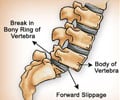Effective implementation of fall prevention programs could cut elderly falls by 11 pct.
Researchers from Yale School of Medicine have revealed that effective implementation of fall prevention programs could cut elderly falls by 11 pct.
The combination of fall prevention educational campaigns and interventions also reduced fall-related hip fractures and head injuries among elderly by 10 pct.The team led by Mary E. Tinetti, M.D., the Gladys Phillips Crofoot Professor of Medicine, epidemiology and public health and investigative medicine at Yale School of Medicine believes that incorporating fall-risk assessment and management into their practices, physicians and health care providers can significantly reduce elderly falls.
During the study, Tinetti and her team compared the rates of serious fall injury and health care related to falls among people age 70 and older in two regions of Connecticut.
For four years, health care providers in the greater Hartford region were contacted as part of a multi-component program targeting poor balance, vision loss, medication use, improper footwear, and blood pressure drops upon standing.
Clinicians were encouraged to cut medications and increase physical therapy referrals among other proven fall prevention strategies.
About 3,000 clinicians, administrators and policy experts in this region also received fall prevention information in the form of brochures, seminars, posters and patient education materials. Those in the Southern Connecticut region followed the usual care practice.
Advertisement
"The data show that fall risk assessment and management can be embedded into practice.
Advertisement
The study is published in the July 17 New England Journal of Medicine.
Source-ANI
SPH










